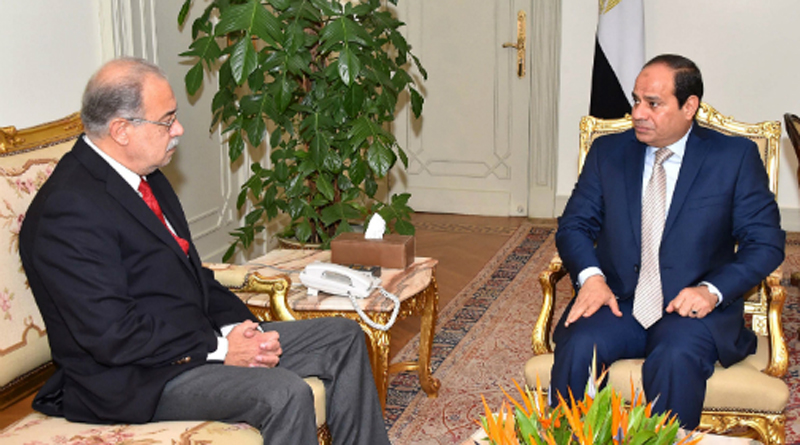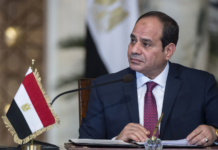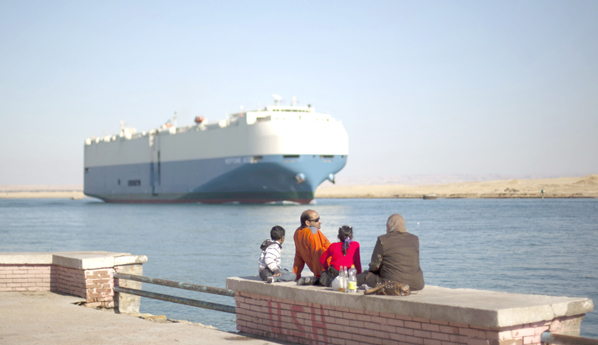by Angy Essam
Egypt’s President Abdel-Fattah El-Sisi has accepted Prime Minister Ibrahim Mahlab’s resignation of the Cabinet, which included the resignation of all the Cabinet members.
Sisi told the Cabinet to remain in a caretaker role until the formation of a new cabinet. Egypt’s Cabinet was expected to resign after the parliamentary elections set for October and November, paving the way for a cabinet to be formed by the new parliament. The presidency did not give an explanation for the move, but it came days after the agriculture minister was arrested over corruption charges.
Some governmental officials stated that President Sisi was not satisfied with the performance of several ministries in the former Cabinet. According to some official sources, the reshuffle was intended to pump new blood into the government in light of the Ministry of Agriculture scandal.
Agriculture Minister Salah Al-Din Helal and others are under investigation for charges of taking over $1 million in bribes. The previous Egyptian government had long been plagued by corruption allegations, particularly regarding land deals. The president insists that he is tackling corruption no matter who is involved.
Key portfolio holders, the defense, interior and foreign ministers, are expected to remain in the new government, which will be responsible for overseeing long-delayed parliamentary elections that will take place in phases from 17 October to 2 December. The country’s private media, while praising Sisi, have routinely slammed the government in recent weeks, accusing ministers of incompetence and of being out of touch with Egyptians suffering from years of unrest since the 25 January Revolution. President Sisi had asked the petroleum and mineral resources minister, Sherif Ismail, to form a new cabinet within one week after Mahlab’s government submitted its resignation. Ismail has been petroleum minister since July 2013, shortly after the overthrow of president Mohamed Morsi.
Ismail is an engineer who held senior posts at several state-run energy firms, and is seen as one of the best performing ministers. As oil minister, he oversaw politically sensitive reforms, slashing energy subsidies, and also paid back some arrears to foreign energy companies to improve Egypt’s image among investors. Ismail, who was born in 1955, studied Mechanical Engineering at Ain Shams University and graduated in 1978. Upon completing his studies, he worked as an engineer in Mobil until 1979, after which he joined ENPPI. At ENPPI, where he remained until 2000, Ismail worked as an engineer and was eventually appointed as director general of technical affairs and as a member of the board of directors.
The new prime minister also served as executive deputy chairman and then chairman of the Egyptian Holding Company for Petrochemicals (ECHEM). He was later appointed as chairman of the Egyptian Natural Gas Holding Company (EGAS). Following his tenure at EGAS, Ismail was appointed chairman of the state-run Ganoub Al-Wadi Petroleum Holding Company (GANOPE).
Ismail has declared that he has started choosing the ministers of the new cabinet, pointing out that President Sisi gave him only one week to finish the new government formation.
Three new ministries
The Middle East Observer knew that the new cabinet will be free of half of the ministers of the Ibrahim Mahlab’s Cabinet, while there will be new minister of agriculture, Hani Dahi, Minister of Transport, and the Ministers of Culture and manpower, and Antiquities.
The ministers who will resume their work are Colonel General Sedki Sobhi, Minister of Defense, Major General Magdy Abdel Ghaffar, Minister of Interior, Ambassador Sameh Shoukry, Minister of Foreign Affairs; Mohamed Shaker, Minister of Electricity and Energy, and Hany Qadry, Minister of Finance, and Ashraf AlAraby , the Minister of Planning , and Husam Al Maghazi , Minister of Water Resources and irrigation , and Hossam Kamal, Minister of Aviation , and Khaled Abdul Aziz, Minister of Youth and Sports .
Furthermore, there will be announcement of two new ministries and the Ministry of small and Medium Enterprises, is expected to go for Ambassador Mahmoud Al Saeed to the nomination by the Ministry of Egyptians abroad, to the possibility of merging some of ministerial portfolios in addition to, the integration of the Ministry of Information and Culture into one.
The Middle East Observer knew from sources that Mr Ismail began in the assessment of some of the names of candidates to take over the Ministry of Communications and Information Technology, and included a list of nominations many prominent in the telecom sector names left their posts during the previous period, including Engineer Mohamed Nawawi, former chief executive of the Telecom Egypt company. Among nominees are General Salah Seyada, Minya Governor, who is nominated to be the minister of local development.
Hisham Alayli, former chief executive of a National Telecommunication Regulatory Authority, the article by a “Najm” and Yasser AlQadi, former chief executive of the Information Technology Industry Development.
Middle East was informed that the formation of the new government’s negotiations will end by tomorrow, a specially, regulatory bodies that will be completed during the last period of collecting all the information and data about the new ministers and there is three nominations for each ministry to choose the best nominations.
Ismail announced that President Sisi’s main instructions to the new government is to work with clear vision suitable to the coming period as well as preparing a strong long-term programme. Sisi demanded that Ismail and his government concentrate on certain priorities like the budget deficit, major projects completion and developing citizen services. Concerning who of the former ministers will continue in their positions, Ismail said that it is still early to take those decisions. President Sisi praised the efforts exerted by former Prime Minister Ibrahim Mahlab and his ministers, saying that they have served Egypt in critical and hard times. Mahlab thanked the ministers of his resigned government, declaring that all of them did all they could to serve Egypt, and pointed out that the coming stage requires new blood and that the former ministers will remain ready to work for Egypt in any position.
Ashraf Salman, the investment minister, said that every government has its strengths and weaknesses, and that the government did not resign because of certain mistakes, assuring that all its members are ready to do anything for Egypt’s progress.















